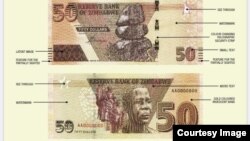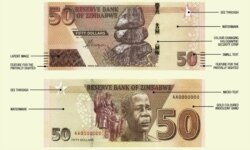The Reserve Bank of Zimbabwe (RBZ) says it will introduce new fifty dollar notes tomorrow in a bid to ease transactions for the banking public.
In a statement posted on its website, RBZ Governor John Mangudya said, “The Bank shall release ZW$360 million through the normal banking channels and banks are expected to fund their respective accounts held at the Reserve Bank and collect the cash from 7 July 2021.”
The RBZ notified the public about the security features of the bank notes featuring what appears to be an image of Mbuya Nehanda, Matobo Hills, National Heroes Acre and the Zimbabwe bird.
According to the RBZ, the banknotes “have a unique rough feel which is different from other printed materials such as magazines or computer print outs; (watermark) when held against the light the Zimbabwe bird and ‘RBZ’ can be seen. In reverse this will appear backwards; The windowed security strip changes from red to green with holographic element when tilted. When held up to the light it (windowed security strip) reads as a continuous line reading ‘50’ on the front and ‘RBZ 50’ on the back.
“The strip changes from red to green with holographic element when tilted. When held up to the light it reads as a continuous line reading ‘50’ on the front and ‘RBZ 50’ on the back; six horizontal bars appear in the bottom right and left hand corners. These have a raised effect to help the partially sighted recognise this banknote, and the value numeral can be seen in the feature on the bottom left Iridescent Band: when the note is tilted.”
Some independent economists commended the RBZ for coming up with the new notes while critics claimed that it will fuel inflation in a economy already devastated by stagnant growth rising COVID-29 cases.
In a statement recently, the World Bank in its Zimbabwe Economic Update, said the country’s Gross Domestic Product (GDP) growth in was projected to reach 3.9 percent in 2021, a significant improvement after a two-year recession.
The World Bank said ecconomic growth this year will be led by recovery of agriculture as rains normalize, businesses adjust to limitations caused by the COVID-19 (coronavirus) pandemic, and inflation slows down. However, the World Bank said, disruptions caused by the COVID-19 pandemic will continue to weigh on economic activity in Zimbabwe, limiting employment growth and improvements in living standards.
The bank said economic recovery is expected to strengthen further in 2022 with GDP growing at 5.1 percent as the deployment of vaccines intensifies and implementation of National Development Strategy 1 (2021-2025) bears fruits. “Overall, the COVID-19 global contagion continues to pose significant downside risks, and thus the global and local outlook remains uncertain. A prolonged pandemic, weaker global demand, and heightened macroeconomic instability could choke economic growth, increase poverty, and worsen human capital development outcomes.
The World Bank said mitigating these risks requires domestic policies to strengthen and sustain macroeconomic stability – which is critical for consolidating economic recovery. It said recent efforts to stabilize prices through rule-based monetary and exchange rate policies have been effective and must be continued and expanded. The World Bank further noted that fiscal policies supportive of these efforts have thus focused on avoiding monetary financing and quasi-fiscal activities, reducing distortive subsidies, and improving fiscal and debt transparency.
In its ZEU, the bank quoted Mukami Kariuki, World Bank Country Manager, as saying, “Improving the country’s growth prospects will require further attention to policies that strengthen the quality of service delivery in the social sectors. Preserving lives during an unprecedented that protects livelihoods, strengthens social protection, improves food security, and ensures better education outcomes.”
Facing tight public finances and limited recourse to external financing, Zimbabwe will need to rely mostly on reallocating domestic resources to optimal public uses and leveraging private financing and humanitarian support where possible. Addressing underlying challenges in health, education, social protection, and food security will require sustained financing, strengthened accountability frameworks and investments in appropriate management information systems.
The ZEU, Overcoming Economic challenges, Natural Disasters, and the Pandemic: Social and Economic Impacts, provides the World Bank perspective on macroeconomic and poverty developments and discusses ways to strengthen public service delivery in key sectors. This is the third economic update for Zimbabwe produced by the World Bank. Economic Updates are a standard World Bank tool for macroeconomic and fiscal monitoring.





